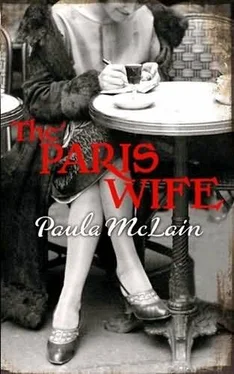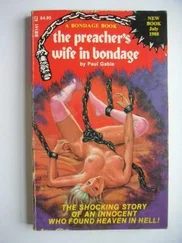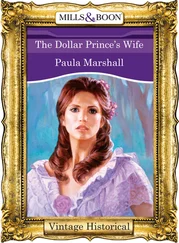I passed the ear around the table so everyone could admire it and be horrified in turn. Duff got drunk very quickly and began to flirt openly with Harold, who was too surprised and pleased to be discreet about it. The two disappeared at one point, which had Pat furious. When an hour or more had passed, they wandered back in a very jolly mood, as if nothing were amiss.
“You little bastard,” Pat said to Harold. He stood and immediately lurched to one side.
“Oh, put a lid on it, darling,” Duff said blithely. But Pat wouldn’t be chided.
“Just get the hell away from us, would you?” he said to Harold.
“I don’t think Duff would like that. You want me here, don’t you?”
“Of course, darling, I want everyone.” She reached for Ernest’s glass. “Be a pal, would you?”
Ernest nodded; she could have the glass, could have every drink on the table as far as he was concerned. It was Harold who disgusted him. “Running to a woman,” he said under his breath. “What’s lower than that?”
The waiter came around with more drinks and food, but the evening wouldn’t be set right. A canker boiled up and tainted everything that had been so powerful and fine.
Ernest sensed this, too, and tried to bring the talk around to Ordóñez and his posture, his veronicas.
“Which is the veronica, again?” Duff said.
“It’s when the matador stands turned to the bull with his feet fixed and swings the cape away from the bull very slowly.”
“Yes, of course,” Duff said. “It was marvelous, wasn’t it?”
“Don’t believe her, Hem,” Pat said meanly. “She doesn’t remember any of it.”
“Give a girl a break, Pat.” She turned back to Ernest. “I’m just a little tight now. I’ll remember more tomorrow. I swear I’ll be good then.”
Ernest looked at her sadly. “All right,” he said, but he was clearly disappointed in her and with the whole group. The air had gone out of everything.
Back at the hotel that night, I took the ear, folded it into several more handkerchiefs, and put it in my bureau drawer.
“The thing will stink before long,” Ernest said, watching me do it.
“I don’t care.”
“No, I wouldn’t either.” He started to undress slowly and thoughtfully. “When this is all over,” he said finally, “let’s follow Ordóñez to Madrid and then Valencia.”
“Will it ever be over?”
“Of course it will.” He turned to face me. “Ordóñez was wonderful, wasn’t he? He makes all of this seem very ugly and very stupid.”
I closed the bureau drawer, then took off my clothes and climbed into bed. “I’m ready to forget Pamplona. Why don’t we try now? Help me, will you?”
At the end of that very long week, we disbanded, and everyone went off separately. Don left for the Riviera looking sad and exhausted. Bill and Harold were headed back to Paris, but took Pat and Duff as far as Bayonne. Ernest and I boarded a train to Madrid, where we took rooms at the Pension Aguilar, an unfashionable hotel in the Calle San Jeronimo that was small and very quiet with no tourists. It was like heaven after Pamplona. We went to the bullfights every day and were there the afternoon Juan Belmonte, arguably the best torero of all time, was badly gored in the belly and carried off to the hospital. We’d followed his fights for some time, and Ernest had always admired his bowlegged and hard-jawed determination, but we began to see, even before Belmonte was injured, that Ordóñez was nearly as great as the master. His movements were perfection, and his bravery never wavered, and we watched him, both of us, in awe.
One afternoon Ordóñez paid me the very great honor of letting me hold his cape before the corrida began. He came very close and I saw the utter smoothness of his boy’s face and the depth and clarity of his eyes. He said nothing when he handed the cape to me but was very serious.
“I think he’s in love with you,” Ernest said, when Ordóñez had walked away to build energy in the crowd.
“How could he be? He’s a child,” I said, but I was proud and felt changed by the honor.
Back at the hotel that night when we were dressing for dinner, Ernest said, “I’m working out a new novel. Or it’s working itself out, really, in my head. About the bullfights. The hero will be Ordóñez, and the whole thing will take place in Pamplona.” His eyes were bright, and the enthusiasm in his voice was unmistakable.
“That sounds awfully good.”
“It does, doesn’t it? I’m calling the young torero Romero. It starts at a hotel, at three in the afternoon. Two Americans are staying there, in rooms across the hall, and when they go to meet Romero, it’s a great honor and they notice how alone he is, and how he’s thinking about the bulls he’ll face that day. He can’t share that with anyone.”
“He would feel that way, wouldn’t he?” I said. “You have to write it.”
“Yes,” he said, and although we left and had a long and delicious dinner with several bottles of wine between us, he was already with the book, inside of it. Over the coming days, his thinking grew deeper. He began to write in intense spurts, in the cafés early in the mornings, and in the hotel very late at night, when I could hear the aggressive scratching of his pencil. When we left Madrid for the fiesta at Valencia, he’d filled two thick notebooks, two hundred handwritten pages in fewer than ten days, but he wasn’t happy with the opening anymore.
“I’m thinking it should start in Paris and then move. It’s what happens in Paris that fuels the fire. You can’t have the rest without it.”
“You always said you couldn’t write about Paris because you were too close to it.”
“Yes, I know, but for some reason it’s coming easily. We were in Pamplona two weeks ago, but I can write that, too. I don’t know why. Maybe all of my thoughts and rules about writing are just waiting to be proven wrong.”
“It’s good to be on fire, isn’t it?”
“I hope it goes on like this forever.”
It did go on. In Valencia, the excitement over the fiesta had pitched everything into a fever and we could just enjoy it. We sat at a street café and ate prawns sprinkled with fresh lime and cracked pepper, and beautiful paella in a dish nearly as wide around as our table. In the afternoons we went to the bullfights where Ordóñez swept his veronicas with absolute perfection.
“There it was. Did you see it?” Ernest said, pointing into the ring.
“What?”
“His death. The bull was so close. That’s what makes the dance of it. The torero has to know he’s dying and the bull has to know it, so when it’s pulled away at the last second, it’s like a kind of magic. That’s really living.”
One afternoon while he was napping and I was feeling restless, I thumbed through his notebooks, reading here and there admiringly. Quite by accident I came upon pages of sayings and turns of phrase that were recognizably Duff’s. I felt a shock at first, reading them. He had listened so closely to her, getting everything down, capturing her perfectly. And now it was all coming through, changed only slightly, in his heroine. It made me feel terribly jealous of her all over again until I was able to make sense of it. Ernest was a writer, not Duff’s lover. He’d seen her as a character, maybe even from the beginning. And now that he was living in the book, not in the street cafés in Pamplona, the tension and ugliness could be useful. The whole time had been constructive and necessary for the work. That’s why the words were coming so strongly now, with such heat.
From Valencia we went to Madrid again, and then to San Sebastian to escape the rising summer temperatures. In San Sebastian and then in Hendaye, Ernest wrote with great intensity in the mornings, and then we spent the rest of the day swimming and sunning ourselves on the beach. The sand was hot and sugary, and there were long purple mountains in the distance, and the crashing of the surf filled our ears and lulled us into a happy stupor. But by the end of the first week in August, I was missing Bumby too much to enjoy any more of it. I went back to Paris and Ernest returned to Madrid alone. There he worked better and harder than ever before. It was as though he was inventing the book and inventing himself as a writer at the same time. He wrote to say he’d stopped sleeping except for an hour here and there. But when I wake again , he wrote, the sentences are there waiting for me, shouting to be set down. It’s extraordinary, Tatie. I can see the end from here and it’s something .
Читать дальше












